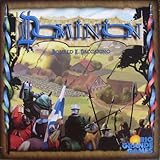Alchemist

When you play this, you draw two cards and may play an additional Action card this turn. In the Clean-up Phase, when you discard this, if you have at least one Potion card in play, you may put Alchemist on top of your deck.
This is optional and happens before drawing your new hand. If you have no cards in your deck when you do this, Alchemist becomes the only card in your deck. If you have multiple Alchemists and a Potion, you can put any or all of the Alchemists on top of your deck. You don't have to have used the Potion to buy anything, you only need to have played it.
Apothecary
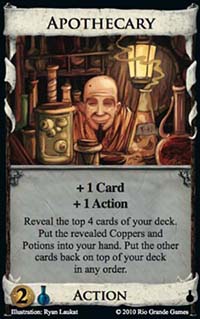
You draw a card first. Then reveal the top four cards, put the Coppers and Potions into your hand, and put the rest back on top of your deck. If there aren't four cards left in your deck, reveal what you can and shuffle to get the rest.
If there still aren't enough cards, just reveal what there is. Any cards that are not Copper and are not Potion go back on top of your deck in an order you choose. You cannot choose not to take all of the Coppers and Potions. If after revealing four cards there are no cards left in your deck, the cards you put back will become the only cards in your deck.
Apprentice

If you do not have any cards left in hand to trash, you do not draw any cards. If you trash a card costing  , such as Curse or Copper, you do not draw any cards. Otherwise you draw a card per coin the card you trashed cost, and another two cards if it had
, such as Curse or Copper, you do not draw any cards. Otherwise you draw a card per coin the card you trashed cost, and another two cards if it had  in its cost. For example, if you trash a Golem, which costs
in its cost. For example, if you trash a Golem, which costs 
 , you draw 6 cards.
, you draw 6 cards.
Familiar
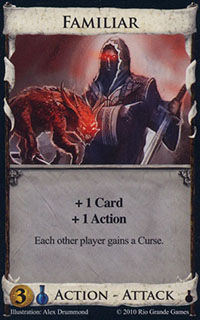
If there aren't enough Curses left to go around when you play Familiar, you deal them out in turn order, starting with the player to your left. If you play Familiar with no Curses remaining, you will still get +1 Card and +1 Action. A player gaining a Curse puts it face-up into his Discard pile.
Golem
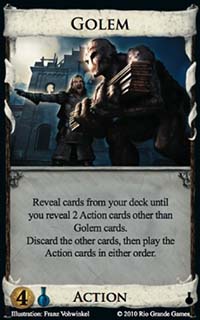
Reveal cards from the top of your deck, one at a time, until you have revealed two Action cards that are not Golem. If you run out of cards before revealing two non-Golem Actions, shuffle your discard pile (but not the revealed cards) and continue.
If you run out and have no discard pile left either, you just get the Actions you found. Discard all of the revealed cards except for the non-Golem Actions you found.
If you did not find any, you're done. If you found one, play it. If you found two, play them both, in either order. You cannot choose not to play one of them. These Action cards are not in your hand and so are unaffected by things that look for cards in your hand. For example, if one of them is Throne Room (from Dominion), you cannot use it on the other one.
Herbalist
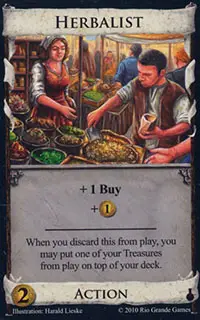
When you play this, you get an extra coin to spend this turn, and may buy an additional card in your Buy phase. When you discard this from play (usually during Clean-up), you may choose a Treasure card you have in play, and put that card on your deck. If you have no cards in your deck, that Treasure will become the only card in your deck.
You choose what order to discard cards during Clean-up; so, for example, if you have Herbalist, Potion, and Alchemist in play, you could choose to discard Alchemist first, putting it on top of your deck, then discard Herbalist, and put Potion on top of your deck. If you have multiple Herbalists in play, each one will let you put another Treasure from play onto your deck when you discard it.
Philosopher's Stone
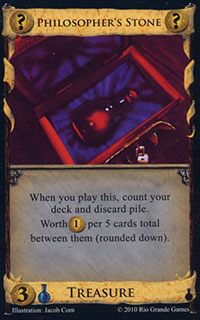
This is a Treasure card. It is a Kingdom card; it will only be in games where it is randomly dealt out as one of the 10 Kingdom cards, or otherwise selected to be one of them. It is played during your Buy phase, like other Treasure cards.
When you play it, count the number of cards in your deck and discard pile combined, divide by 5, and round down. That is how many coins this produces for you. Once played, the amount of coins you get does not change even if the number of cards changes later in the turn.
The next time you play it, count again. If you play multiple copies, obviously the number will be the same for all of them. It does not matter what order your discard pile is in, but the order your deck is in matters.
Do not change that order while counting! You will get to look through your discard pile as you count it. You only count your deck and discard pile, not your hand or cards in play or set aside cards. You cannot play more Treasures after buying something in your buy phase; so for example you cannot buy a card, then play Philosopher's Stone, then buy another card.
Possession

You are not taking a turn with the deck of the player to your left; that player is taking a turn, with you making the decisions and gaining the cards. This is a crucial difference to keep in mind when considering card interactions - the "you" in all cards still refers to the player being Possessed, not the player doing the Possessing. Possession has several pieces to it:
You can see the Possessed player's cards for the entire turn, which means you will see his next hand during Clean-up. You will also see any cards he is entitled to see due to card rules; for example, you can look at cards he has set aside with Native Village (from Seaside). You can count any cards he can count.
You make all decisions for the Possessed player, including what cards to play, decisions those cards provide, and what cards to buy.
Any cards the Possessed player would have gained in any way, you gain instead; this includes cards bought, as well as cards gained due to Actions. The cards you gain this way go to your discard pile, even if they would have gone to that player's hand or the top of his deck or somewhere else. You only gain cards he would have; you do not gain tokens he would have (for example from the Dominion: Seaside card Pirate Ship).
During the Possessed turn, whenever one of that player's cards is trashed, set it aside, and that player puts it into his discard pile at the end of the turn, after Clean-up.
This counts as the card being trashed, so, for example, you could trash a Mining Village (from Dominion: Intrigue) and get the  . Getting those cards back at end of turn does not count as those cards being gained (so for example, you won't get them). Other players' cards that are trashed during that turn are not returned.
. Getting those cards back at end of turn does not count as those cards being gained (so for example, you won't get them). Other players' cards that are trashed during that turn are not returned.
Cards passed with Masquerade (from Dominion: Intrigue) are not being gained or trashed, and so are passed normally. Cards returned to the Supply with Ambassador (from Dominion: Seaside) are also not being trashed, and so return to the Supply normally.
If you make another player play an Attack via Possession, that Attack will hit you like it would normally. If you want to use a Reaction in response to that Attack (such as Secret Chamber from Dominion: Intrigue), you would be the one revealing the Reaction, not the player being Possessed.
Possession causes an extra turn to be played, like the card Outpost does (from Dominion: Seaside). The extra turn happens only after this turn is completely over - you will have discarded everything and drawn your next hand. Outpost only prevents itself from giving a player two consecutive turns, it does not prevent other cards or the rules from doing so.
So, for example, if you play Possession in a two-player game, then after the Possession turn, that player still gets his normal turn. If he played Outpost during that turn though, it would not give him an extra turn. If you play both Outpost and Possession in the same turn, the Outpost turn happens first.
If you make someone play Outpost during a turn in which you Possessed them, that player will get the extra turn and make decisions during it and so forth, not you; if you make someone play Possession during a turn in which you Possessed them, that will make that player Possess the player to his left, rather than you getting to Possess anyone further.
Possession turns (and other extra turns) do not count for the tiebreaker. Once the game ends, no further turns are played, including extra turns from Possession and Outpost.
Unlike Outpost, Possession is not a Duration card. It is discarded in the Clean-up phase of the turn you played it.
Possession is cumulative; if you play it twice in one turn, there will be two extra turns after this one.
Potion
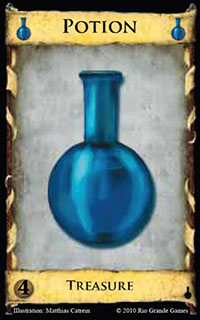
This is a basic Treasure card. It costs  and produces
and produces  . It is not a Kingdom card; see the Preparation rules.
. It is not a Kingdom card; see the Preparation rules.
Scrying Pool
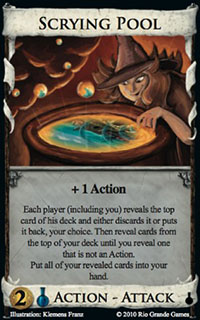
First you reveal the top card of each player's deck, and either have them discard it or have them put it back. If people care about the order, go clockwise, starting with yourself. You make a separate decision for each player. After you finish making those decisions, reveal cards from the top of your deck until you reveal a card that isn't an Action card. If you run out of cards without revealing a non-Action card, shuffle your discard pile and keep going.
If you have no discard pile left either, stop there. Put all of the revealed Action cards into your hand, plus that first non-Action you revealed. If the very first card you revealed was not an Action, that card goes into your hand.
Cards with multiple types, one of which is Action, are Actions. The only cards that go into your hand are the ones revealed as part of revealing cards until finding a non-Action; you do not get discarded cards from the first part of what Scrying Pool did, or cards from other players' decks.
Transmute
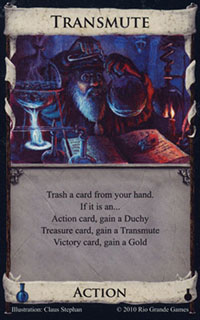
If you have no cards left in hand to trash, you do not get anything. If you trash a Curse to this, you do not get anything - Curse is not an Action card or Victory card or Treasure card. If you trash a card with more than one type, you get each applicable thing.
For example, if you trash an Action-Victory card (such as Nobles, from Dominion: Intrigue), you gain both a Duchy and a Gold. Gained cards come from the Supply and go to your discard pile. If there are no appropriate cards left to gain, you don't gain those cards.
University

Gaining an Action card is optional. If you choose to gain one, it comes from the Supply, must cost no more than  , and goes to your discard pile. Cards with multiple types, one of which is Action, are Actions and can be gained this way. Cards with
, and goes to your discard pile. Cards with multiple types, one of which is Action, are Actions and can be gained this way. Cards with  in their cost can't be gained by this.
in their cost can't be gained by this.
Vineyard

This Kingdom card is a Victory card, not an Action card. It does nothing until the end of the game, when it is worth 1 victory point per 3 Action cards in your Deck (counting all of your cards - your Discard pile and hand are part of your Deck at that point). Round down; if you have 11 Action cards, Vineyard is worth 3 victory points.
During set-up, put all 12 Vineyards in the Supply for a game with 3 or more players, but only 8 in the Supply for a 2-player game. Cards with multiple types, one of which is Action, are Actions and so are counted by Vineyard.
Continue Reading
